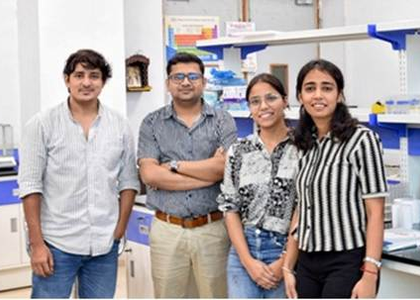Indian scientists tap cholesterol’s potential to power next-gen electronic devices
By IANS | Updated: September 8, 2025 18:40 IST2025-09-08T18:35:55+5:302025-09-08T18:40:11+5:30
New Delhi, Sep 8 While cholesterol, the fat-like substance, has typically been related to heart diseases, scientists from ...

Indian scientists tap cholesterol’s potential to power next-gen electronic devices
New Delhi, Sep 8 While cholesterol, the fat-like substance, has typically been related to heart diseases, scientists from the Institute of Nano Science and Technology (INST), Mohali, an autonomous institute of the Department of Science and Technology (DST), showed its potential to power next-generation spintronic devices.
The team introduced cholesterol-based nanomaterials as novel platforms for future quantum technologies and spintronic applications.
“Cholesterol can be used to control the spin of electrons -- an invisible quantum property that could contribute to the development of energy-efficient next-generation spintronic devices. This is because it enables precise control over molecular properties due to its intrinsic handedness (chirality) and flexibility,” said the INST team, led by Dr. Amit Kumar Mondal.
The study showed that cholesterol-based nanomaterials can manipulate the spin of electrons -- a quantum feature critical for the next generation of electronics.
By combining cholesterol with different metal ions, the researchers created nanomaterials that selectively filter electron spins.
Interestingly, both spin directions could be controlled within a single system. This means that with a simple chemical tweak or an achiral chemical stimulus, the scientists could tune the flow of spin information, revealed the findings recently published in the journal Chemistry of Materials.
“This chemical tunability provides a powerful and elegant technique for manipulating spin information with high precision, representing a substantial advancement in the development of biomaterials for advanced quantum and spin technologies,” the scientists said.
This could lead to Energy-efficient memory chips for greener technology and bioelectronic devices, since the spin-based materials can help separate molecules with extreme precision, they added.
Disclaimer: This post has been auto-published from an agency feed without any modifications to the text and has not been reviewed by an editor
Open in app